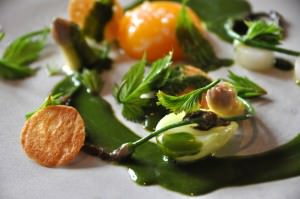Locally Foraged Ingredients: “Farm-to-Table” Gives Way to “Wilderness-to-Table”
Long before the luxuries of farming, grocery stores, and restaurants, our ancestors hunted and gathered food in order to survive. Over the years, modern-day shoppers and restaurant patrons have come to feel a disconnect between their dining habits and the distant, often unknown sources of their mass-produced food; thus, the concern for ethical and sustainable eating has spread rapidly. Consumer demand for organic and humanely raised food has increased, along with an interest in consuming ingredients that are both locally produced and in season. For the past several years, the farm-to-table movement has begun to evolve a step farther, giving rise to the “wilderness-to-table” movement, with restaurant patrons seeking out venues that serve what has come to be described as “locally foraged and hunted” food – and even cocktails containing ingredients that are locally foraged.
The trend is of course popular in large, fashionable American cities like San Francisco, Chicago, and New York – but even Salt Lake City and places in Washington state are taking part, too. Today the growth of the “wilderness-to-table” movement is tremendous, and foraged food restaurants can be found in Brazil, the West Indies, and at least as far away as Hong Kong. Some venues even invite their patrons to go on foraging expeditions to pick ingredients for their own meals.
Sustainability is Key
As the trend gains speed in popularity, of course, consumers who are already sensitized to the importance of ethical dining are in search of venues that engage in the practice sustainably. Consumers demand that food and beverage buyers and chefs who forage be knowledgeable about when picking a plant actually helps encourage growth (for example) by thinning crowded leaves – and when doing so would simply deplete or endanger the supply. They also must know and obey local laws and ordinances, which call for the prosecution of illegally foraging in places such as the U.K.’s Epping Forest and Hampstead Heath.
Today’s restaurant patrons love and demand restaurants that serve sustainably foraged ingredients, not only because doing so is ethical and environmentally sound, but also because the quality and flavor of such products cannot be beat; local foraging, after all, helps ensure that diners are eating food that is both seasonal and incredibly fresh. To top it off, patrons enjoy an ever-changing menu that offers them the thrill of trying many new, greatly varied, and flavorful dishes.
- Uncorkd Adds New Vendor Purchasing, Tracking and Reporting Functionality - February 13, 2018
- Uncorkd Adds New Inventory Management Functionality with POS Integration - July 24, 2017
- How Many Red or White Wines Should You Have on Your List - May 3, 2016



